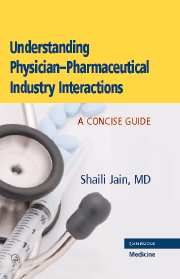Book contents
- Frontmatter
- Contents
- Acknowledgments
- Foreword
- Introduction
- 1 Gifts from the Pharmaceutical Industry to Physicians: Do They Influence your Prescribing?
- 2 Ethical Considerations of Receiving Gifts from the Pharmaceutical Industry
- 3 One on One: An Analysis of the Physician–Pharmaceutical Company Representative (PCR) Detailing Interaction
- 4 Medical Academia and the Pharmaceutical Industry
- 5 Teaching Physicians in Training about Pharmaceutical Industry Promotion
- 6 Continuing Medical Education: How to Separate Continuing Medical Education from Pharmaceutical Industry Promotion
- 7 Professional Policies on Physician–Pharmaceutical Industry Interaction (PPII)
- 8 Preserving Professionalism: Patients' Perceptions of Physicians' Acceptance of Gifts from the Pharmaceutical Industry
- 9 To Sample or Not to Sample? The Use of Pharmaceutical Industry–Supplied Medications in Medical Practice
- 10 Physician–Pharmaceutical Industry Interactions (PPIIs), the Law and the Media
- 11 Direct-to-Consumer Advertising (DTCA)
- 12 Pharmaceutical Industry Interactions with Health Care Professionals: A Global Perspective
- 13 Internet Resources for Teaching about PPII and Independent Sources of Information about Prescription Medicines
- Appendix I
- Appendix II
- Index
- References
4 - Medical Academia and the Pharmaceutical Industry
Published online by Cambridge University Press: 03 March 2010
- Frontmatter
- Contents
- Acknowledgments
- Foreword
- Introduction
- 1 Gifts from the Pharmaceutical Industry to Physicians: Do They Influence your Prescribing?
- 2 Ethical Considerations of Receiving Gifts from the Pharmaceutical Industry
- 3 One on One: An Analysis of the Physician–Pharmaceutical Company Representative (PCR) Detailing Interaction
- 4 Medical Academia and the Pharmaceutical Industry
- 5 Teaching Physicians in Training about Pharmaceutical Industry Promotion
- 6 Continuing Medical Education: How to Separate Continuing Medical Education from Pharmaceutical Industry Promotion
- 7 Professional Policies on Physician–Pharmaceutical Industry Interaction (PPII)
- 8 Preserving Professionalism: Patients' Perceptions of Physicians' Acceptance of Gifts from the Pharmaceutical Industry
- 9 To Sample or Not to Sample? The Use of Pharmaceutical Industry–Supplied Medications in Medical Practice
- 10 Physician–Pharmaceutical Industry Interactions (PPIIs), the Law and the Media
- 11 Direct-to-Consumer Advertising (DTCA)
- 12 Pharmaceutical Industry Interactions with Health Care Professionals: A Global Perspective
- 13 Internet Resources for Teaching about PPII and Independent Sources of Information about Prescription Medicines
- Appendix I
- Appendix II
- Index
- References
Summary
Bob was feeling happy. He had just received the prescriber profiling information that he had requested. It appeared sales of Vivre had gone up after the dinner talk last week. Bob had expected this. The speaker, Dr. Johnson, an eminent academic psychiatrist, was employed by MedCorp to give talks on Vivre. He was a charismatic, much respected clinician with an impeccable CV. He had been involved in the company-sponsored trials for Vivre and had been impressed by the medication. Subsequently, he had become involved in doing many industry-sponsored educational activities for the medication. Dr. Johnson was paid for his time and received tens of thousands of dollars a year in additional income from these activities. Having seen the encouraging figures, Bob called Dr. Johnson to arrange several more speaking engagements over the coming months.
U.S. academic centers have partnered with industry so that academic innovation can be rapidly and efficiently brought to market. Concerns have been raised that academia is no longer as autonomous as it once was and that industry sponsorship may influence the outcome of research and undermine traditionally held academic values.
Examples of academic institutions' relationships with private industry include ownership of stock in the sponsors of research being conducted at the institution and specific research centers and teaching programs in which students and faculty members essentially carry out industry research.
- Type
- Chapter
- Information
- Understanding Physician-Pharmaceutical Industry InteractionsA Concise Guide, pp. 16 - 22Publisher: Cambridge University PressPrint publication year: 2007



